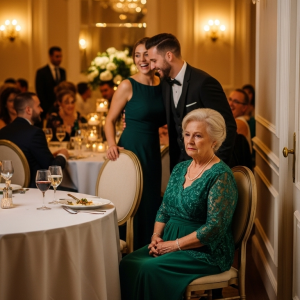When I was twenty-three and fresh out of college, I met Sarah. She had a way of making everyone laugh, and I was hooked from day one. I came from a solidly middle-class family; my dad was an electrician, my mom a nurse. We had enough, but luxuries were rare. Sarah’s family was different. Her dad owned several car dealerships, and her mom ran a boutique. They had the kind of money that made life easy.
Her parents, especially her dad, were never thrilled about me. It wasn’t outright hostility, but a steady drip of subtle comments designed to remind me of my place. “So, Matt, what’s your five-year plan?” or “You know, Sarah’s used to a certain lifestyle.” I ignored it because I loved Sarah, and she stood by me.
When we started planning the wedding, her parents dropped the prenup bomb. Her dad, Tom, handed me a thick stack of papers in his mahogany-paneled office. “This is just a formality, Matt,” he said, his expression serious. “It’s to protect Sarah’s future. I’m sure you understand.”
I didn’t understand. I felt insulted. I was making $40,000 a year, but I had big plans. The prenup stated that if we divorced, I’d walk away with nothing but what I’d earned myself. It was all about protecting her, not us. I hated every line.
I brought it up with Sarah, hoping for an ally. Instead, she was placating. “Matt, it’s not a big deal. It’s just paperwork. It doesn’t change how I feel about you.” I could tell she felt stuck between me and her family. I didn’t want to put her in that position, so I swallowed my pride and signed it. I told myself it didn’t matter because I wasn’t marrying her for their money.
Looking back, that was my first mistake. The wedding was beautiful but awkward, a clear divide between my borrowed suits and their country-club catalog attire. In the early years of our marriage, we were happy. We lived in a small apartment, budgeted carefully, and saved every penny. The prenup lingered in the back of my mind, a symbol of her family’s distrust. Every time her dad made a sarcastic remark about my job, it stung. Her mom would joke about how “smart” they’d been to have me sign it. They said it with smiles, but it always felt like a slap. Still, I kept my head down. I loved Sarah, and I figured as long as we were happy, none of it mattered. But as our lives began to change, that piece of paper became the center of a storm I never saw coming.
For years, I ground it out at my IT job, feeling like I’d hit a wall. The pay was decent, but there was no room for growth. I knew I had to take a risk. A coworker had started making serious money freelance coding for startups, and it sparked an idea. I had always been good at web development, so I spent my weekends and nights honing my skills. Sarah thought I was crazy. “You’re already working full-time,” she’d say, frustrated. “Why are you adding more work?” But I couldn’t shake the feeling that this was my chance.
After six months, I landed a client that changed everything. A small tech startup needed someone to build their entire back-end system. The pay was great, but the real prize was the stock options they offered. It was a gamble, but something about their vision clicked with me.
For the next year, I worked like a maniac. My day job from nine to five, and the startup project every other waking moment. Sarah was supportive but strained. Our movie nights were replaced by the sound of my keyboard, and small arguments about my absence became more frequent. “Just a little longer,” I’d promise. “I’m building something for us.”
Then, it happened. The startup I was working with was acquired by a tech giant. My stock options skyrocketed. One day I was worried about our mortgage; the next, I had enough money to pay off everything and still have a multi-million dollar cushion.
I’ll never forget the look on Sarah’s face when I told her—stunned, joyful, and a little disbelieving. I quit my IT job the following week. The first thing I did was take Sarah on a surprise trip to Hawaii, a vacation we’d only ever dreamed of. It was my way of showing her that the sacrifice had been worth it. But even in paradise, my mind was racing. I loved working for myself, and I decided to start my own company.
I launched a property management business, using my newfound capital to invest in something stable and scalable. It was a steep learning curve, but I threw myself into it with the same intensity I’d given my coding. Slowly but surely, the business began to thrive. By the time I was thirty, I wasn’t just comfortable; I was wealthy. I was proud of what I’d built, and I thought, foolishly, that I had finally earned her family’s respect.
Respect wasn’t exactly what I got. Instead, I got interest. It started subtly. Sarah’s dad, Tom, began calling for “advice” on investments. At first, I was happy to help, figuring he finally saw me as an equal. But the questions soon became more personal.
“You know, you could invest with me,” he suggested during one call. “Just to help get things off the ground.” The deal he described sounded shaky. I politely declined, telling him I wasn’t in a position to invest. That was the first time I noticed the shift. A distinct coolness entered his tone.
Meanwhile, Sarah’s mom, Diane, started dropping hints about how expensive their lifestyle was. “We’re not as young as we used to be, Matt,” she’d say with a sweet smile. “Sometimes I think about how lucky you and Sarah are.”
Lucky. That word grated on me. This wasn’t luck; it was years of sleepless nights and relentless work. But I kept quiet to avoid tension.
Things came to a head one weekend at their house. Over dinner, Tom brought up the prenup. “You know, Matt,” he said, “I’ve been thinking about that agreement we had you sign. Don’t you think it’s a little… outdated now?”
I froze. I hadn’t thought about that document in years. I glanced at Sarah, who was suddenly fascinated by her mashed potatoes. She knew this was coming.
“I don’t know, Tom,” I said carefully. “It hasn’t been an issue. Why change it?”
Diane chimed in. “It’s just that things are different now. We were protecting Sarah’s future then, but now… you’re family, after all.”
There it was. The word family, used as a tool of manipulation. I looked at Sarah again, pleading with my eyes for her to step in. She stayed silent.
“Honestly, I don’t see a reason to get rid of it,” I said finally. Tom’s smile tightened. On the drive home, I confronted Sarah. “Why didn’t you say anything back there?”
She sighed, looking out the window. “Because I don’t want to be stuck in the middle, Matt. You know how they are. They just want what’s best for me.”
“What about what’s best for us?” I countered. “This is our marriage, not theirs.”
Over the next few weeks, the pressure mounted. Sarah started echoing her parents’ sentiments, her tone shifting from neutral to accusatory. “You have nothing to lose by canceling it,” she’d argue. “If you really trust me, you’d dissolve it.” It felt like I was fighting a battle on two fronts.
The arguments about the prenup grew more frequent and more heated. “This isn’t about trust, Sarah, it’s about your parents trying to control us!” I’d insist.
“Or maybe it’s about you not trusting me!” she’d shoot back. “What kind of husband keeps something like this in place after all these years?”
I knew we needed to get away, to have a real conversation without her parents’ influence hanging over us like a storm cloud. I suggested a trip to a quiet cabin by the river, a place we used to love. Sarah agreed, but her mood was sullen.
The first evening was tense but peaceful. The next morning, as we sat on the dock, I decided to rip off the bandage. “Sarah, I need to know what’s really going on. Is this about us, or is this about your parents?”
She sighed, annoyed. “This is about us, Matt. My parents don’t control how I think. I’m the one saying the prenup doesn’t make sense anymore.”
I didn’t buy it. “Come on, Sarah. They’re the ones who made me sign it, and now they’re the ones trying to get rid of it. That’s not a coincidence.”
That’s when her tone turned sharp. “Maybe the issue isn’t them, Matt. Maybe it’s you. Maybe you’re so wrapped up in your own insecurities that you can’t see how unfair this is to me.”
“Insecure?” I shot back. “You think I’m insecure because I won’t tear up an agreement your parents insisted on because they didn’t trust me?”
She shrugged, her voice turning cold. “Well, if you can’t trust me now, maybe we shouldn’t even be talking about a future together.”
It hit me like a physical blow. “Wow. So now you’re threatening our marriage because I won’t bend to your parents’ demands? Real mature, Sarah.”
“It’s not a threat, Matt. It’s the truth. If you’re so obsessed with this prenup, maybe you don’t see me as your partner anymore.”
That was it. I stood up, looked her dead in the eye, and said, “Don’t you dare twist this around. I’ve worked my behind off for everything we have, with zero help from your parents. If anyone should be questioning loyalty, it’s me.”
I walked back to the cabin, my mind racing. The rest of the trip was a disaster. We barely spoke. By the time we drove home, it was clear we were on completely different pages.
Part 5: The Betrayal
Things came to a head last Wednesday. I came home to find Sarah’s entire family sitting in my living room. It was an ambush.
“Matt,” Tom began without preamble, “it’s time to resolve this prenup situation. It’s tearing the family apart.”
I looked at Sarah, hoping she would intervene. She just stared at the floor. “I’ve made my position clear,” I said, my voice cold. “The prenup stays. This is not up for discussion.”
Diane jumped in. “You’re being unreasonable, Matt. Sarah has given everything to this marriage.”
“And I’ve spent years building a life for us while dealing with your constant interference!” I retorted.
Before I could continue, Tom said something that made my blood run cold. “You’re not the only one with options here, Matt. Sarah deserves to be protected, and if you can’t see that, maybe this marriage isn’t as strong as you think.”
It was a veiled threat. I told them all to leave. Sarah stayed behind, and we had the worst fight of our lives. She accused me of being selfish; I told her I was done being treated like a wallet. She stormed out, saying she was staying with her parents.
The next day, I got a call from Amy, Sarah’s shy younger sister. She sounded nervous and asked to meet. At a coffee shop, she dropped a bombshell.
“Matt, I overheard something,” she said, her voice shaking. “Sarah and my parents… they’ve been planning this for months. They said the prenup has to go before Sarah can leave you. It’s the only way she can get what she ‘deserves’.”
“Leave me?” I was stunned. “Why would she want to leave me?”
Amy hesitated. “Because she’s been seeing someone else. Her parents know, Matt. That’s why they’re pushing so hard. They think if she divorces you without canceling the prenup, she won’t get anything.”
The ground gave way beneath me. It all made sense now—the pressure, the arguments, her sudden change in attitude. I thanked Amy, promising to keep her out of it. When I got home, I went through our shared finances. Sure enough, there were charges I didn’t recognize: expensive restaurants, hotels, jewelry stores. The betrayal was staggering. I called my lawyer and told him everything. This wasn’t just about a prenup anymore. This was war.
After Amy’s revelation, I moved fast. My lawyer and I compiled the evidence: the infidelity, the suspicious charges, and Amy’s testimony about her parents’ involvement. When I finally confronted Sarah, she didn’t even try to deny it. She cried, played the victim, and blamed me.
“I felt so lonely while you were working all the time,” she sobbed. “You cared more about your job than me.”
“Don’t you dare,” I told her, my voice devoid of emotion. “I was building a life for us. You made a choice, and now you have to live with the consequences.”
The look on her face when I told her I’d already filed for divorce was priceless. She begged me to reconsider, but I told her the trust was gone. There was no fixing this.
And then there was the prenup. Oh, that beautiful, life-saving document. Thanks to the ironclad agreement her family had insisted on, Sarah walked away with nothing. Not a penny of my hard-earned money, no spousal support, no division of assets. Her infidelity sealed the deal.
Her parents were furious. Diane left long, ranting voicemails about how I was “ruining Sarah’s life.” I didn’t respond. It wasn’t long before I found out the real reason for their desperation: their businesses had been failing for years. Their lavish lifestyle was all smoke and mirrors.
When Sarah moved back in with them, the cracks in their perfect facade began to show. She went from our beautiful home to her childhood bedroom. And the other guy? He ghosted her the second he realized she didn’t have access to my money. So there she was: jobless, penniless, and stuck with her equally broke parents.
A few weeks after the divorce was finalized, she showed up at my office. She looked rough, tears streaming down her face. “Matt,” she pleaded, “I made a mistake. Please, I need you to forgive me. We can start over.”
I leaned back in my chair and just looked at her. “Sarah, you didn’t just cheat on me. You actively plotted to leave me while trying to take what I’ve worked for. That’s not something I can forgive.”
When she realized I wouldn’t budge, she got angry. “You’re going to regret this, Matt! You’ll end up alone!”
“Sarah,” I said calmly. “You didn’t care about me. You cared about the life I provided. Now you get to figure things out on your own.” I had security escort her out. That was the last time I saw her.
Life is quieter now. Amy and I still keep in touch; she was the only one with the courage to do the right thing, and I’ll always be grateful. As for Sarah and her parents, I hear things are getting worse for them financially. They made their bed. If there’s one thing I’ve learned, it’s




